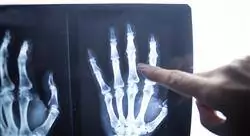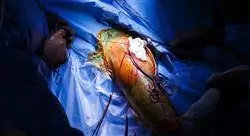University certificate
The world's largest faculty of medicine”
Introduction to the Program
Scientific evidence increases the quality of trauma surgery. Keeping up-to-date is key to providing better care to our patients
Orthopedic surgery and traumatology is constantly evolving. The volume of information increases exponentially every year and it is impossible to be updated in all areas of the specialty, unless you have a team of experts in different sub-areas that performs this work for the specialist, making an intelligent discrimination of information.
In addition, the current tendency to sub-specialize in a specific anatomical area or surgical technique makes it more difficult to keep up to date in those areas that are less commonly treated and, at times, makes it difficult and costly to keep up to date with the latest developments. It should also be noted that the increase in the average life expectancy is leading to a higher number of degenerative and disabling osteoarticular injuries.
This Postgraduate diploma allows the specialist to be updated on the latest procedures in orthopedic and traumatologic surgery of the upper limbs.
The Postgraduate diploma in Upper Limbs Orthopedic Surgery and Traumatology contains the most complete and updated scientific program on the market"
The Postgraduate diploma in Upper Limbs Orthopedic Surgery and Traumatology contains the most complete and updated scientific program on the market. The most important features of the program include:
- Development of clinical cases presented by experts in trauma surgery. The graphic, schematic, and eminently practical contents with which they are created contain information that is indispensable for professional practice
- It contains exercises where the self-assessment process can be carried out to improve learning
- Interactive learning system based on algorithms for decision making in surgical patients with osteoarticular pathology and oncological and infectious processes
- Clinical practice guidelines on the different pathologies
- All of this will be complemented by theoretical lessons, questions to the expert, debate forums on controversial topics, and individual reflection assignments
- Content that is accessible from any fixed or portable device with an Internet connection
This Postgraduate diploma may be the best investment you can make in the selection of an updated program for two reasons: in addition to updating your knowledge in surgery of upper limbs, you will obtain a Postgraduate diploma from TECH Global University"
Its teaching staff includes specialists of recognized prestige in trauma surgery, who bring their experience to this training.
The multimedia content developed with the latest educational technology will provide the professional with situated and contextual learning, i.e., a simulated environment that will provide an immersive training program to train in real situations.
This program is designed around Problem Based Learning, whereby the physician must try to solve the different professional practice situations that arise during the course. For this purpose, the physician will be assisted by an innovative interactive video system developed by renowned experts in the field of trauma surgery with extensive teaching experience.
Increase your decision-making confidence by updating your knowledge with this Postgraduate diploma course"
Do not miss this opportunity and choose the best way to stay updated in upper limb surgery"
Why study at TECH?
TECH is the world’s largest online university. With an impressive catalog of more than 14,000 university programs available in 11 languages, it is positioned as a leader in employability, with a 99% job placement rate. In addition, it relies on an enormous faculty of more than 6,000 professors of the highest international renown.

Study at the world's largest online university and guarantee your professional success. The future starts at TECH”
The world’s best online university according to FORBES
The prestigious Forbes magazine, specialized in business and finance, has highlighted TECH as “the world's best online university” This is what they have recently stated in an article in their digital edition in which they echo the success story of this institution, “thanks to the academic offer it provides, the selection of its teaching staff, and an innovative learning method aimed at educating the professionals of the future”
A revolutionary study method, a cutting-edge faculty and a practical focus: the key to TECH's success.
The most complete study plans on the university scene
TECH offers the most complete study plans on the university scene, with syllabuses that cover fundamental concepts and, at the same time, the main scientific advances in their specific scientific areas. In addition, these programs are continuously being updated to guarantee students the academic vanguard and the most in-demand professional skills. In this way, the university's qualifications provide its graduates with a significant advantage to propel their careers to success.
TECH offers the most comprehensive and intensive study plans on the current university scene.
A world-class teaching staff
TECH's teaching staff is made up of more than 6,000 professors with the highest international recognition. Professors, researchers and top executives of multinational companies, including Isaiah Covington, performance coach of the Boston Celtics; Magda Romanska, principal investigator at Harvard MetaLAB; Ignacio Wistumba, chairman of the department of translational molecular pathology at MD Anderson Cancer Center; and D.W. Pine, creative director of TIME magazine, among others.
Internationally renowned experts, specialized in different branches of Health, Technology, Communication and Business, form part of the TECH faculty.
A unique learning method
TECH is the first university to use Relearning in all its programs. It is the best online learning methodology, accredited with international teaching quality certifications, provided by prestigious educational agencies. In addition, this disruptive educational model is complemented with the “Case Method”, thereby setting up a unique online teaching strategy. Innovative teaching resources are also implemented, including detailed videos, infographics and interactive summaries.
TECH combines Relearning and the Case Method in all its university programs to guarantee excellent theoretical and practical learning, studying whenever and wherever you want.
The world's largest online university
TECH is the world’s largest online university. We are the largest educational institution, with the best and widest online educational catalog, one hundred percent online and covering the vast majority of areas of knowledge. We offer a large selection of our own degrees and accredited online undergraduate and postgraduate degrees. In total, more than 14,000 university degrees, in eleven different languages, make us the largest educational largest in the world.
TECH has the world's most extensive catalog of academic and official programs, available in more than 11 languages.
Google Premier Partner
The American technology giant has awarded TECH the Google Google Premier Partner badge. This award, which is only available to 3% of the world's companies, highlights the efficient, flexible and tailored experience that this university provides to students. The recognition as a Google Premier Partner not only accredits the maximum rigor, performance and investment in TECH's digital infrastructures, but also places this university as one of the world's leading technology companies.
Google has positioned TECH in the top 3% of the world's most important technology companies by awarding it its Google Premier Partner badge.
The official online university of the NBA
TECH is the official online university of the NBA. Thanks to our agreement with the biggest league in basketball, we offer our students exclusive university programs, as well as a wide variety of educational resources focused on the business of the league and other areas of the sports industry. Each program is made up of a uniquely designed syllabus and features exceptional guest hosts: professionals with a distinguished sports background who will offer their expertise on the most relevant topics.
TECH has been selected by the NBA, the world's top basketball league, as its official online university.
The top-rated university by its students
Students have positioned TECH as the world's top-rated university on the main review websites, with a highest rating of 4.9 out of 5, obtained from more than 1,000 reviews. These results consolidate TECH as the benchmark university institution at an international level, reflecting the excellence and positive impact of its educational model.” reflecting the excellence and positive impact of its educational model.”
TECH is the world’s top-rated university by its students.
Leaders in employability
TECH has managed to become the leading university in employability. 99% of its students obtain jobs in the academic field they have studied, within one year of completing any of the university's programs. A similar number achieve immediate career enhancement. All this thanks to a study methodology that bases its effectiveness on the acquisition of practical skills, which are absolutely necessary for professional development.
99% of TECH graduates find a job within a year of completing their studies.
Postgraduate Diploma in Orthopedic Surgery and Upper Extremity Traumatology
Orthopedic surgery and upper limb traumatology is a discipline specializing in the diagnosis, treatment and rehabilitation of injuries and disorders affecting the arms, shoulders, elbows, hands and wrists. This branch of medicine is concerned with restoring function and improving the quality of life of patients suffering from traumatic, degenerative or congenital conditions in this area of the body. Would you like to focus your career in this field? Then the Postgraduate Diploma in Orthopedic Surgery and Upper Limb Traumatology created by TECH Global University is ideal for you. With a comprehensive and updated approach, this Postgraduate Certificate will provide you with the theoretical and practical knowledge necessary for the diagnosis, treatment and rehabilitation of the most common injuries and pathologies in this specialty.
Study an online postgraduate course on orthopedic surgery and upper limb traumatology.
Taught by renowned specialists in the field, this Postgraduate Diploma offers a comprehensive curriculum that covers everything from the anatomical and physiological fundamentals of the upper limbs to the most advanced surgical techniques used in orthopedic surgery. As you progress through the program, you will learn about fractures, dislocations, sports injuries, degenerative diseases and other disorders related to the upper limbs. In addition, you will learn about the latest technological advances used in orthopedic surgery: arthroscopy and robotic-assisted surgery. Finally, emphasis will be placed on the importance of rehabilitation and physical therapy in the recovery process of patients. At the end of the Postgraduate Certificate, you will be prepared to face the clinical challenges of upper limb orthopedic surgery.









